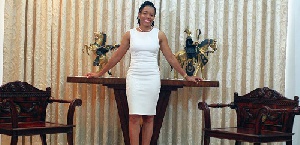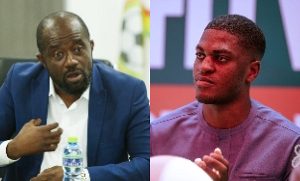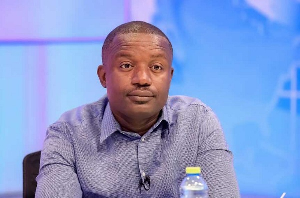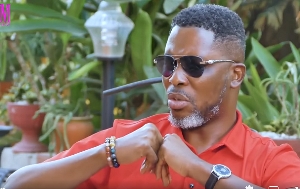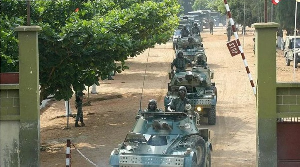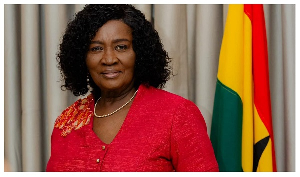Almost thirteen years ago, I had the privilege of interviewing her father, the great African son and Ghana’s gift to the World, the charismatic President Jerry John Rawlings. Therefore, I was really excited when one of our friends, whom we fondly call Lady Patience dropped the hint that she could help facilitate an interview with Dr. Zanetor Agyeman-Rawlings.
Dr. Zanetor, the eldest child of JJ Rawlings had just beaten a sitting Member of Parliament to grab the National Democratic Congress (NDC) ticket for Klottey Korley Constituency. There was no shadow of doubt that she would be an interesting subject.
So when my team and I flew from Lagos to Accra, we were full of expectations because we had no prior interaction with Dr. Zanetor, but we knew if she was a true daughter of JJ who is affectionately called “the old man”, two things were certain: she would be a stickler for time and a no nonsense disciplinarian.
We checked into the Movenpick Ambassador Hotel located in the heart of the city that evening but we slept very little because the appointment had been fixed for early the next morning and our Publisher, Bashorun Dele Momodu, in his usual manner, was calling almost every minute to ensure that all was well.
On first contact, it was obvious that Dr. Zanetor is certainly a chip of the old block, she combines the doggedness of her mother, the irrepressible Nana Konado Agyeman-Rawlings and the philanthropic or should I say, people-loving spirit of her dad.
Her handshake was firm, a result of her strict exercise regime, we later learnt, but her smile was welcoming.
We also noticed that though a politician, she was not too keen to hug the spotlight. To our surprise, she said she was not used to photo shoots, that she is at her best when she was working with the people on the streets. Impressive!
After our explanation that it was part of the package, and that doing the job of touching lives and selling your ideas to the people go parri passu. She was very cooperative, it shows she is a lady who keeps her word.
When the shoot was over, she said she had some engagements around her constituency, that bright, sunny Saturday afternoon, and she graciously allowed our cameras join her entourage.
On the streets, she came to life, it was apparent that this was her forte, speaking confidently and with candor, she addressed players of Hope For The Future Club, a football team that had been promoted to Division 2, insisting that she would not defend anyone who goes into drugs or misbehaves in public. She charged them to be worthy Ambassadors of Klottey Korle.
At another meeting of Ghanaian youths, who have just been offered various employment opportunities (which she facilitated), Dr. Zanetor also charged them to be role models.
She urged them to work harder than any other set of workers so as to pave the way for more opportunities for others. Discipline, decorum and hard work were consistent themes throughout her speeches. Indeed my admiration for her shot up a few notches after seeing her, in what she jokingly referred to as her natural habitat.
Dr. Zanetor came across as a lady packed full of ideas, a lady who is passionate about touching lives and elevating society. A lady who is a go-getter.
Later, when we sat down for an interview in her parent’s Ridge Home, she told us more about her intention to become the next Member of Parliament for Klottey Korle. Enjoy!
How do you feel when you do good and touch peoples’ lives
For me, it is no achievement to be the only person in your family to move ahead. It is in many ways a let down if you are moving ahead and you can’t carry others along.
The question for me is always this; why are you alive? What is your purpose in life. If you find yourself in a position where you are supposed to make a difference in peoples’ lives, to help, to empower people, then you have a duty to actually do so. I am passionate about what I do, so for me, what drives me is just knowing that that one can do something that can uplift communities or the society.
Was it that passion to uplift society that propelled you into politics
In many ways that was what actually pushed me in that direction because I was already doing a few things along those lines not mainstream politics though. Following a lot of consultations and investigations.
(Cuts in) Consultations? All Politicians always say that
It is important that we recognize that one doesn’t have all the answers, that is why consultation is important because you seek advice, seek counseling to add to what you know and sometimes you might have a blind spot that you don’t even know about. Having a different person offer their opinion or offer their advice can help you actually recognize that there is something you don’t even know about a particular situation and their perspective could help you build a better platform and a better strategy.
It was through asking and consulting and of course praying about it that made me finally make the decision to go ahead. Sometimes it is easier to bring all the resources responsible for community change or empowerment together when you find yourself in mainstream politics because you have access to more resources than you might ordinarily do in an individual capacity.
I am actually confused with your constituency, can you clarify tha name
The reason you are seeing the different versions is because the name has changed many times. It is actually Klottey Korle on the official book presently.
What part of Accra does this constituency cover
If you can use the Odo River as one boundary. That is the boundary on the Western side, it goes all the way down, it cuts across Graphic Road to Nkrumah Circle Area and then the Southern border of that will be the Atlantic Ocean. So all that extending right through Official Town, Adabraka, through Art Centre to Osu and the boundary of La, then you make your way up. And then, the Ring Road is the Northern boundary more or less.
You seem to know this area like the back of your hand
(smiles) You have to, having been around quite a bit
Having lived around here for years, what do you think are the major challenges of the residents
Under major headings; we can say-sanitation, employment or unemployment whichever way you want to look at it are two of the big ones, skills development and education. But if you go down to the community level as opposed to the big titles, we can break it down further.
What I like to do is allow the communities say what their specific problems are because you can’t know better than someone who lives in the community or know what their situation is like.
What we have done as a team is to map out the constituencies based on their problems. The problems are either related to the environment or employment. If it is the people you are talking about, are we talking of the aged who need support or are we talking about a large number of youths who need to be employed or who have not done well enough in their exams or need to be either trained in some kind of skills or repeating certain exams or is it a case of certain areas where they need facilities like street lights or they need their roads to be repaired?
In some areas, the market always gets flooded when it rains, it’s a low-lying area. How do we manage that so that peoples’ goods or whatever commodities they have aren’t destroyed anytime it rains? Flooding is a huge problem and a huge part of us in this Constituency, it is a major affliction of this Constituency if I can put it that way and we have to develop a strategy to deal with it.
It is very obvious that the work to be done are enormous, is it not possible that people will be expecting too much from you as a Member of Parliament
It is possible, but I think once there is a recognition of the fact that it is a collaboration, it becomes easier.
I cannot do it alone and I have never claimed that I can do it alone, it is about getting the right people involved and also about getting people in the community to realize that they have an active role to play in their empowerment as well.
There won’t always be formal jobs that people can be employed in. Sometimes it is about creating a niche or sometimes it is about making people realize that for example along the beach where you have a lot of plastic waste, that is actually money waiting to be made. Having the people in that community recognize that by collecting plastics and selling them to the recycle companies, it is a source of income.
That action does two things: keeps the beach clean and puts a bit of money in their pockets. Those kinds of things kind of shifts the paradigm from that expectations of constantly being a receiver instead, becoming somebody who is an active participant in changing things and giving. That is the kind of thing that I generally like to focus on.
Otherwise, you create a sphere of overdependency and that does not help either parties. If you can help empower people so that they can be independent and also empower others, you have that kind of chain effect, where you start something with a group and each person takes on other people. For example, if you have a situation where you are able to create job opportunity as a result of training people in something, they have a responsibility of also training other people and so on and so forth. That is the kind of community spirit that we want to build. Yes the expectation is there
But are you sure you will be able to cope with the expectations
Of course, it is a team effort. I will be as strong as the weakest member of my team. When I talk about my team, I don’t mean officially specific members, I am actually talking about the community because it is a team building exercise, it is a movement and we are all part of it.
Let us step down a bit to your background, you are the first daughter of a man that is respected by many Africans especially Nigerians and I personally respect and admire him a lot, tell us a bit about growing up with the great Jerry John Rawlings.
In the early days, I tended to see him a lot more on television than I actually saw him in real life (laughs heartily). It was interesting because though we didn’t see him as often because he lived in the Castle for most of the time and we lived separately with my mum and sometimes my grandma, but we felt his presence.
It was a case of each time he was around, it was more of an impactful interaction.
There was something new he shared, some new skills he would teach you. It is interesting because you saw him from a distance through the eyes of everybody else. It was not until we were much older that we really spent more time with him which was during National Democratic Congress (NDC) Period. The pressure was there because you were a sort of an ambassador of the family.
Whatever you did, people were watching, that was not easy at all. You get conscious with what you do because people would say look at them, his children are OK or they are not well behaved.
My mum had a huge role because she was the one constant in our lives and the disciplinarian in the family. It was an interesting experience, you went to school, you are aware of your background but you don’t get any preferential treatment.
So you were normal
Pretty much except the awareness of what you are doing and how it reflects.
How did that lead to you becoming a Medical Doctor. Was that your personal choice
It was my choice actually; I always had this interest in healing. When I was younger, if there was an incident, I used to be the first to go and pick up the Fist Aid Box, it was just something that I was interested in and it just grew.
Basically, It was as a result of my interest in it that I went down that path. Initially, I remember I wanted to join the Airforce
(Cuts in) Because of your daddy
I actually enjoyed flying, I would have done that but then again through consultation, that word again (Laughs heartily). I chose to do Medicine.
Have you been practicing
I have not formerly practiced since I moved back from Ireland because the politics kind of took over and it has not been very possible to practice the same way I used to in terms of general practice
However, I apply my knowledge in my every day life, in many ways, it guides my approach to life because I have a philosophy in terms of Medicine which says that you treat someone holistically.
When the person walks through the door, you don’t see a ear, a heart or kidney, there is a whole process, so you need to just take into consideration the fact that whatever it is that you are seeing, there could be an underlining factor related to other unrelated things that you might want to consider.
In the same way, that is how I approach politics or our community in building exercises of empowerment. It is really just about looking at the different factors together to form a whole as opposed to just picking one thing which might be an effect rather than a cause. It is just about digging a bit deeper. There is another philosophy that when a patient walks through the door the diagnosis is based on what they tell you, so the ability to listen and also ask the right questions would actually bring out a response and it is very important. You might go into a community and say this community needs street light but the priority may just be a gutter or it might be water. So when you listen, you will be able to find a balance of what it is important and what the person really needs. So whatever you do, you have to have the buy in of the people and the community who are in actual fact the primary beneficiary of what you are doing.
Before you formerly joined politics which is now taking so much of your time, what were you doing
I was mostly working towards setting up a holistic Wellness Centre in addition to actually attending various conferences where I speak about various developmental issues as well as encouragement and empowering of the youths.
How did your political journey begin, at what stage did you say that you were ready to go into the murky waters of politics
That is a very difficult question to answer because I don’t think there was a particular day. There was a day when I said ok, I am in, which is basically when you have to take that decision to take that position of filing your nomination. If you haven’t committed to the codes at that point, you are not going to be filling a nomination.
The thing that pushed me along those lines was after that disaster last year, apart from working with TV3 and various partners at that time to actually provide relief for the various communities that were affected by the floods, we raised funds which was basically to help support all of that. For me, the relief items, going to meet the families, that was the effect side of it. But it was not deep enough. For me it was a case of; why was this always happening and what can we do to change the cause of event so that we don’t have a repeat of this? Is it a case of clearing the drainages to ease free flow, is it a case of maintenance? How can you prioritize so that you can mitigate the effect of this annual rainfall. We needed to change in terms of how we prepare for this rain so as to reduce the effects. This rain causes so much damage and it is devastating for them. It was all of that, and the fact that it seemed to be the way to go and that propelled me to politics.
What did your parents say when you decided to join politics
I don’t think I can quote either of my parents in this one but it was a very big decision and it was really a case of: can you maintain your integrity as you take this path? Can you get past the noise to deal with issues, can you stay true to your purpose? So those were fundamental questions, it was really a case of don’t sell your soul in the process of trying to achieve something because then it is not worth it. It is really a case of how do you find that balance between politics and actually getting things done.
Talking about balance, your dad is Founder of the National Democratic Congress (NDC) and your mum is the Founder of another party, National Democratic Party (NDP), do you have any conflict, how have you coped with this situation
To be fair, I am a registered member of the NDC, and I have been for many years.
(Cuts in) I thought I heard that you were never a registered member of NDC
You hear a lot of things. The fact is that my mum was instrumental to the creation of the NDC; she, in very many ways is a part of how the party came to be. As to how things went the way they went, I will leave that to historians to write about it, perhaps I leave it to her to give her version of events. I will not consider it fair to speak on that.
Is it a conflict in some ways?
No. I think the point is one should be able to exist without not being in total agreement with everybody but understanding the picture. For me it is not an issue because underneath all of that there is the major issue which is the people, our environment. How are we working together as a nation? If we allow partisanship to split us in such a way that we cannot work together to make things better, it makes me wonder what it is we are really working towards as a developing country. I wouldn’t consider that as any conflict of interest
Talking about conflicts, your candidacy has also brought up a lot of conflicts, how emotionally challenging have these been especially since you are doing this for the things you genuinely believe in and you are having all these road blocks
Some mornings I wake up and I just wonder, if as a developing country we are going to allow purpose for development be sidetrack by issues that are inconsequential. We should be careful not to usurp the power of the people in a bid to reach certain objectives. If we are in a democracy and people have made their choice then we should abide by it. I didn’t impose myself on this constituency, it was a democratic process. There are also some technical things here and there, Has it been exhausting? In many ways I will say so because sometimes with some of these issues you are not quite sure what the end point is, it has been more tiring that even going out there and doing the actual work.
How did you feel the day you actually won the primaries because in African politics, it is not quite easy to remove a sitting MP especially from same party
It was an amazing feeling because a lot of people had come together to work as a team to make it happen so I cannot even take credit and say that I was solely responsible for it.
We moved as a team and it yielded amazing result. We thank God that it went well because it was a good day.
We have few women in politics
(laughs heartily) Are you surprised? Considering what I am going through at the moment?
Anyway what will be your advice to aspiring female politicians
I think we need more women on board, we certainly do. Women have a different approach in general towards dealing with issues whether economic issues, or whether it is issue of conflict.
Women have an outward looking approach towards how things are going to affect the family, especially the children. How will it affect the community?, how can we manage our resources so that many people can benefit as possible?
We need people who can look at our communities in terms of whether it is a company, business or even an household, managing resources in such a way you have an happy household. And a happy household happens when you have healthy people who are well balanced in their lives and are employed.
Definitely, we need more women; the more women we have in mainstream politics the more we will see a shift of events or a shift of attitude towards women in politics because there are a lot of issues I face along the way which would not have been raised if I was a man.
We need more work to be done in terms of gender sensitization, giving women that equal opportunity, I am not saying we should have perfect equality because you can’t compare apples and oranges.
I am just saying we should complement each other. It is a puzzle, we fit together. If we are the same it doesn’t fit well, but if we complement each other, we will have a strong union, complementing one another’s strength. Women being who we are and men being men. By virtue of our physiology and anatomy, men and women are not the same. That balance it is what can create a better society.
In our traditional setting we have the Chief and the Queen Mother, the Queen mothers are responsible for who is made the King or Chief, so the roles are defined and each has unique roles to play.
So, we need more women to restore that balance, to make decisions because when a society suffers, it is the women and children that suffer most. If we have more women in positions of authority, in decision making, there is a long-term thinking that comes into play such as how can we make our children happy?
How have you been able to balance motherhood and politics
It is a tough one. It has been another big challenge in many ways but with the family support, traditionally as Africans we don’t just have the nuclear family, as communities we have the extended families, where we have the aunts, uncles and the cousins and that has made it easier. The extended family has been part of the support base in terms of the family aspect of things with the children in my case and we thank God for that.
Many acknowledge the fact that you are a beautiful and intelligent woman, despite the stress we went through today, you are still glowing, what is your beauty secret
Should I say I thrive in adversity or what (smiles) I just try to manage things in terms of moderation and it helps me to keep my balance and focus. Minding what you eat, exercising when you can.
Try to keep a certain level of discipline in your life in terms of your intake, in terms of your activity. Managing stress, that is one of our greatest problems as a people. If you actually trace the backgrounds of many peoples’ problems, you will discover that there is stress somewhere there. It is about recognizing that the external environment could be at odds with your internal environment and try to create a balance.
How do you relax
Exercising is one of the ways and I listen to music or read too.
Who are your favourite musicians
So many of them. I always feel that it will be unfair to mention some and not mention the others. Depends on the mood, some are local and others are international
Your party has been in power for some years, how will you rate the NDC.
This rating question again.
Well, it is your party, you should be able to say what has been done right and what needs improvement
I think there have been a lot of structural improvement in various sectors under the NDC which I myself have seen. Any nation that is developing is an evolving one which means that your glories of yesterday will not hold until you can improve or maintain or bring more on board. We can actually do better. The day you say you cannot do better is the day you actually lose out because it is an evolving process.
We are aware that the president is seeking a second term, do you think Ghanaians should give him a second chance
Seriously (laughs heartily) Yes I do think so
What has he achieved in your view
In terms of his achievement, I think I would have to bring you the Green book. (It contains President Mahama’s strides in many sectors in all the regions of Ghana).
What are the things you believe he has done in the past four years that you believe should be consolidated upon in the next four years
I can’t tell you all the projects and not mentioning all of what he has achieved might be unfair. The evidence is there for everyone to see. Can we do better? Of course, we can. I think it has to do with the large percentage of youths, we have been concentrating a lot on infrastructure but from what I have observed, it is time to move from infrastructure to investing in the youths. That shift would not be easy, it is going to be a challenge because we have a huge population that fall into the category of youth; there is also high unemployment which actually is global. I lived in Ireland, a lot of Irish Doctors were moving to Australia, Canada and South Africa. The issue of the job market changing is not just here, it is a global phenomenon. The challenge is how to generate innovative ways of job creation. How do we move from that thought process of government should give us jobs to galvanizing the youths to see potentials around them. That is where I would like us to explore going forward.
Your voice is certainly not a small voice in your party, do you speak to the president
(smiles) O dear, yes I do. On occasions.
So what do you discuss
I certainly cannot be telling you that
Ok what kind of person is he
President Mahama is actually a very pleasant person to interact with and very knowledgeable too. He is actually very widely read. Perhaps a lot of people don’t realize this, but he reads a lot. In discussions with him, you will rarely find a situation where his actually ignorant about something, he likes to stay informed.
What are the principles that drive you
No matter where you find yourself, you should be able to carry people along and empower them so they can also lift other people along.
I don’t believe in creating a situation of dependency where people always need you. You have to be able to make yourself expendable to people in terms of empowerment. Otherwise, it is all resting on your shoulders and that is not how to build a society.
For me, empowering people is fundamental to it all. And the interrelation between human beings and your environment, for me is direct. Your environment should be an extension of who you are.
If you are looking at people, you have to examine them in relation to their environment. Their behavior is directly linked to the environment, if you do not understand that, then you may not be achieving much.
I am big on health in terms of wellness. When I talk about wellness, it is not about the person, it is about wellness of you and your environment. Body, spirit, mind and environment. So it not only the external but the internal as well.
How do we move from reacting to actually initiating change, how do we move from constantly expecting things to actually being the one generating change, giving as against receiving because our continent has become generally continent of consumerism. Instead of manufacturing, creating, producing, we are only importing and using.
We are generating so much waste in the process and we don’t have the capacity to deal with such waste. How do we ensure we do not end up with huge landfills? So that we have food material put separately from plastic waste or green waste? So that you can use it to make composite and it can serve as fertilizer, instead of the artificial forms of fertilizer. How do we recycle our plastics? How do we encourage people to stop shopping with plastic bags? Get people to make bags with renewable materials which can be easily recycled?
These are the kinds of things that drive me, being able to understand how to draw a balance between ourselves and the environment, then ourselves and one another, it is all connected. One’s perspective of life has to be holistic to make sense to me.
Lastly, I have always wanted to know this, what is the meaning of your name
It is an Ewe name which means ‘Let the darkness stop’.
That means you are the light, and in the present circumstances, the light of Klottey Korle
Yes, if you say so (laughs heartily)
General News of Saturday, 22 October 2016
Source: ovationinternational.com





